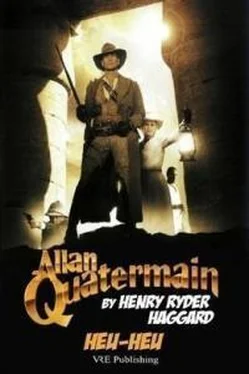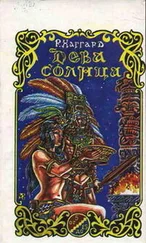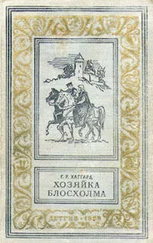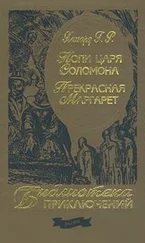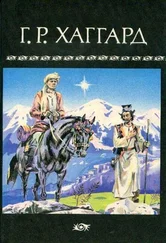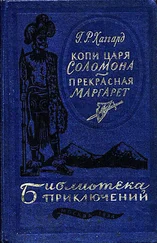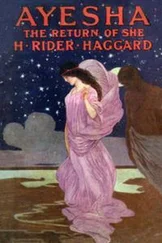Here, however, once more Hans's memory came in useful. Having borrowed my matches, he crept off down the cave and presently returned, dragging a quantity of wood after him, dusty and worm–eaten–looking wood, but dry and very suitable for firing.
"Where did you get that?" I asked.
"Baas," he replied, "when I lived in this place with the Bushmen, long before those black children" (this insult referred to the driver and the voorlooper, Mavoon and Induka by name) "were begotten of their unknown fathers, I hid away a great stock of wood for the winter, or in case I should ever come back here, and there it is still, covered with stones and dust. The ants that run about the ground do the same thing, Baas, that their children may have food when they are dead. So now if those Kaffirs will help me to get the wood we may have a good fire and be warm."
Marvelling at the little Hottentot's foresight that was bred into his blood by the necessities of a hundred generations of his forefathers, I bade the others to accompany him to the cache, which they did, glowering, with the result that presently we had a glorious fire. Then I fetched some food, for luckily I had killed a Duiker buck that morning, the flesh of which we toasted on the embers, and with it a bottle of Square–face from the wagon, so that soon we were eating a splendid dinner. I know that there are many who do not approve of giving spirits to natives, but for my part I have found that when they are chilled and tired a "tot" does them no harm and wonderfully improves their tempers. The trouble was to prevent Hans from getting more than one, to do which I made a bedfellow of that bottle of Square–face.
When we were filled I lit my pipe and began to talk with Hans, whom the grog had made loquacious and therefore interesting. He asked me how old the cave was, and I told him that it was as old as the mountains of the Berg. He answered that he had thought so because there were footprints stamped in the rock floor farther down it, and turned to stone, which were not made by any beasts that he had ever heard of or seen, which footprints he would show me on the morrow if I cared to look at them. Further, that there were queer bones lying about, also turned to stone, that he thought must have belonged to giants. He believed that he could find some of these bones when the sun shone into the cave in the early morning.
Then I explained to Hans and the Kaffirs how once, thousands of thousands of years ago, before there were any men in the world, great creatures had lived there, huge elephants and reptiles as large as a hundred crocodiles made into one, and, as I had been told, enormous apes, much bigger than any gorilla. They were very interested, and Hans said that it was quite true about the apes, since he had seen a picture of one of them, or of a giant that looked like an ape.
"Where?" I asked. "In a book?"
"No, Baas, here in this cave. The Bushman made it ten thousand years ago." By which he meant at some indefinite time in the past.
Now I bethought me of a fabulous creature called the Ngoloko which was said to inhabit an undefined area of swamps on the East Coast and elsewhere. This animal, in which, I may add, I did not in the least believe, for I set it down as a native bogey, was supposed to be at least eight feet high, to be covered with gray hair and to have a claw in the place of toes. My chief authority for it was a strange old Portuguese hunter whom I had once known, who swore that he had seen its footprints in the mud, also that it had killed one of his men and twisted the head off his body. I asked Hans if he had ever heard of it. He replied that he had, under another name, that of Milhoy , I think, but that the devil painted in the cave was larger than that.
Now I thought that he was pitching me a yarn, as natives will, and said that if so he had better show me the picture forthwith.
"Best wait until the sun shines in the morning, Baas," he replied, "for then the light will be good. Also this devil is not nice to look at at night."
"Show it me," I repeated with asperity; "we have lanterns from the wagon."
So, somewhat unwillingly, Hans led the way up the cave for fifty paces or more, for the place was very big, he carrying one lantern and I another, while the two Zulus followed with candles in their hands. As we went I saw that on the walls there were many Bushmen paintings, also one or two of the carvings of this strange people. Some of these paintings seemed quite fresh, while others were faded or perhaps the ochre used by the primitive artist had flaked off. They were of the usual character, drawings of elands and other buck being hunted by men who shot at them with arrows; also of elephants and a lion charging at some spearmen.
One, however, which oddly enough was the best preserved of any of the collection, excited me enormously. It represented men whose faces were painted white and who seemed to wear a kind of armour and queer pointed caps upon their heads, of the sort that I believe are known as Phrygian, attacking a native kraal of which the reed fence was clearly indicated, as were the round huts behind. Moreover, to the left some of these men were dragging away women to what from a series of wavy lines, looked like a rude representation of the sea.
I stared and gasped, for surely here before me was a picture of Phoenicians carrying out one of their women–hunting raids, as ancient writers tell us it was their habit to do. And if so, that picture must have been painted by a Bushman who lived at least two thousand years ago, and possibly more. The thing was amazing. Hans, however, did not seem to be interested, but pushed on as though to finish a disagreeable task, and I was obliged to follow him, fearing lest I should be lost in the recesses of that vast cave.
Presently he came to a crevice in the side of the cavern which I should have passed unnoticed, as it was exactly like many others.
"Here is the place, Baas," he said, "just as it used to be. Now follow me and be careful where you step, for there are cracks in the floor."
So I squeezed myself into the opening where, although I am not very large, there was barely room for me to pass. Within its lips was a narrow tunnel, either cut out by water or formed by the rush of explosive gases hundreds of thousands of years ago—I think the latter, as the roof, which was not more than eight or nine feet from the floor, had sharp points and roughnesses that showed no water–wear. But as I have not the faintest idea how these great African caves were formed, I will not attempt to discuss the matter. This floor, however, was quite smooth, as though for many generations it had been worn by the feet of men, which no doubt was the case.
When we had crept ten or twelve paces down the tunnel, Hans called to me to stand quite still—not to move on any account. I obeyed him, wondering, and by the light of my lantern saw him lift his own, which had a loop of hide fastened through the tin eye at the top of it for convenience in hanging it up in the wagon, and set it, or rather the hide loop, round his neck, so that it hung upon his back. Then he flattened himself against the side of the cavern with his face to the wall as though he did not wish to see what was behind him, and cautiously crept forward with sidelong steps, gripping the roughnesses in the rock with his hands. When he had gone some twenty or thirty feet in this crab–like fashion, he turned and said,
"Now, Baas, you must do as I did."
"Why?" I asked.
"Hold down the lantern and you will see, Baas."
I did so, and perceived that a pace or two farther on there was a great chasm in the floor of the tunnel of unknown depth, since the lamplight did not penetrate to its bottom. Also I noted that the ledge at the side that formed the bridge by which Hans had passed, was nowhere more than twelve inches, and in some places less than six inches wide.
Читать дальше
